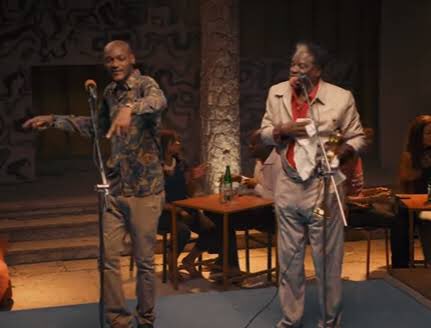
Dr. Victor Olaiya and 2Baba on the set of “Baby Mi Da”
Overview of Veteran Highlife Musician Dr. Victor Olaiya Is Dead At 89
Veteran Highlife musician Victor Olaiya is dead. At 89, the “Omo pupa” hit maker was confirmed dead on Wednesday afternoon. He had been admitted at the Lagos University Teaching Hospital at he was said to have passed at exactly 12 PM.
Victor Abimbola Olaiya (born 31 December 1930), also known as Dr Victor Olaiya, is a Nigerian trumpeter whose works feature prominently in the Highlife genre. He was quite famous during the 1950s and early 1960s, with Alhaji Alade Odunewu of the Daily Times describing him as “The Evil Genius of Highlife.”
In 2017, Dr. Olaiya retired from music. But not before collaborating with 2Baba on the remix of his timeless classic, “Baby Jowo.”
Many eminent Nigerians have reacted to his sad passing, with some touting his demise as the end of the Golden era of Highlife.
Devastated by the news of the passing of Dr. Victor Olaiya – maestro, mentor, legend. Thanks for the beautiful music. Thanks for the inspiration. Blessed for the honour of sharing a mic and stage with you. Rest in peace baba.
— IG: @official2baba (@official2baba) February 12, 2020
My condolences to the family of Nigeria’s highlife legend, Sir Victor Olaiya, OON. His artful delivery on the trumpet and his hits from the 50s are moments we’d never forget. Most recently, the duet with @official2baba, was a musical bridge to travel. May his soul Rest In Peace. pic.twitter.com/xa9VNambw5
— Atiku Abubakar (@atiku) February 12, 2020
Rest in perfect peace, legend.
What Others Are Listening To
- Mr Eazi – Kpalanga (Prod. Killertunes)
- Slimcase ft. Zlatan – Pongilah
- Runtown ft. Bella Shmurda & Darkovibes – Body Riddim
- C Blvck ft. Naira Marley – Baby Kingsway
- Zlatan – Unripe Pawpaw
- Adekunle Gold ft. Kizz Daniel – Jore
- Blackmagic – Version 3.0 (Starving Artist) | Album
- Mayorkun – Geng (Free Verse/Instrumental)
- Rudeboy – Take It
- Quincy – God’s Time (Prod. Jay Swaarg)
- Naira Marley ft. C Blvck – Tingasa (Audio & Video)
- Bella Shmurda – High Tension (EP)
- Soft – Genevieve (Prod. Blaise Beat)
- Mayorkun – Geng (Prod. Que)
- Machel Montano ft. Afro B – Slow Wine
- Mz Kiss – Oluwa Wetin Dey?
- Reekado Banks – Rora (Acoustic Version)
- Krizbeatz ft. Yemi Alade & Skales – Riddim (Official Video)
- J Hus ft. Burna Boy – Play Play
- Rhatti – Biko (Audio & Video)
- DRB Lasgidi ft. Olamide – Shomo (Official Video)
- Krizbeatz ft. Yemi Alade & Skales – Riddim
- Burna Boy ft. Jeremih & Serani – Secret
- Don Conleone – Pepper Everywhere (Official Video)
- Skales ft. Falz & Harmonize – Oliver Twist II (Remix)
- DJ Xclusive – Mad O
- Dremo ft. Zlatan – Chairman (Remix)
- Dyo ft. Lord Afrixana – Papaya
- Ladipoe – Tailor Made
- Efe & Duktor Sett – Your Body
- Yemi Alade – Remind You (Official Video)
- Davolee – Pepper
- Davido – 2020 Letter To You (Official Version)
- Selebobo ft. Tekno – Ova (Official Video)
- Yung L – Juice & Zimm (EP)
- Sam Dutchy ft. Flavour & Waga G – Kpuchie
- Selebobo ft. Tekno – Ova
The post Veteran Highlife Musician Dr. Victor Olaiya Is Dead At 89 appeared first on Latest Naija Nigerian Music, Songs & Video - Notjustok.
from Latest Naija Nigerian Music, Songs & Video – Notjustok
via EDUPEDIA
Comments
Post a Comment